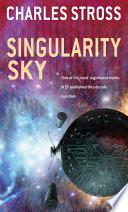Quotes from book
Singularity Sky

Singularity Sky is a science fiction novel by author Charles Stross, published in 2003. It was nominated for the Hugo Award for Best Novel in 2004. A sequel, Iron Sunrise, was published that same year. Together the two are referred to as the Eschaton novels, after a near-godlike intelligence that exists in both.
“Intelligence and infinite knowledge were not, it seemed, compatible with stable human existence.”
Source: Singularity Sky (2003), Chapter 9, “Diplomatic Behavior” (p. 198)
“You got overdraft at the mythology bank.”
Source: Singularity Sky (2003), Chapter 15, “Delivery Service” (p. 329)
“Ultimately, it was easier to change the subject than think the unthinkable.”
Source: Singularity Sky (2003), Chapter 13, “Jokers” (p. 280)
“The Cold War was all about who could build the biggest refrigerator, wasn’t it?”
Source: Singularity Sky (2003), Chapter 14, “The Telephone Repairman” (p. 298)